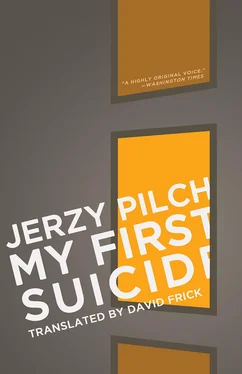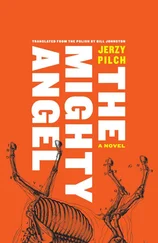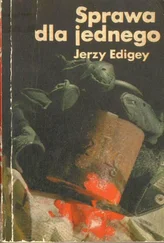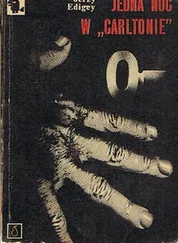Over the Zakopane High Road, the September air grew dark. Not even for a moment did I forget that I was a young poet, and with all my might I watched for the moment when the low clouds would turn into high mountains. I never managed it. Just as in childhood I attempted to grasp the moment of falling asleep, and I always fell into a dark sleep as into a deep well, so now, always, after the next glance at the horizon, the clouds were already gone, and there were the Tatras.
In the darkness I would reach the gigantic garden that had gone wild like a desert island, which surrounded the pension that Gocha’s parents rented out. I would sit on a bench hidden in the hazel groves. I would light a cigarette and wait for the moment when, in the second window from the left, a sepia-toned light would flash, and a supple, long-haired shadow would appear. The shadow would appear, Gocha would open the window, look around, disappear for a moment, then she would appear again and give the sign. Off I went. The massive, and, at the same time, light house designed by Witkiewicz père had to it something of the sailboat scudding over the waves, and something of the fortified castle. I swam across moats, I climbed over walls, I confused the guards. Well, no need to exaggerate here about the guards — Gocha’s parents were quite advanced in years and lived as if in a half-sleep. It sometimes even seemed to me that they had died long ago, and it was their indistinct specters that were wandering about the pension, but most of the time just sitting in wicker chairs on the veranda.
Sometimes the impression that one is dealing with the dead, or that the dead are still living in their former apartments, which are now deserted or have been occupied by others, is as disabling as an attack of madness. When it comes over me, it often seems to me that I myself have been dead for some time, and that, in the empty apartment on Sienna Street, the traces and scents left by me take on my shape, the shadow of my shape. Or, for instance, I am absolutely certain that my folks, even though they haven’t been there for a long time, continue their spectral vegetation in the two rooms on Syrokomla Street. Through the smudged window, which probably hasn’t been washed in a year, you can see Mother, in the pleated skirt, now worn and frayed, which she had once bought in Cepelia, cooking mushroom soup with home-made noodles in the icy kitchen; Father, in a track suit that is as transparent as a spider web, assembling on the ruined balcony a system for watering flowers based on the principle of communicating vessels.
Gocha’s parents could be specters, spirits, phantoms — fine by me. The main thing was that they not notice how, in the late evening, I flit through the lobby illumined by the cadaverous gleam of the television, and then climb the creaking steps and slip into their daughter’s room. For some time, I had fancy thoughts that they noticed me, but that they took me for a specter. Today, I think that they noticed me — and that they just shrugged it all off. Perhaps they weren’t the only specters in the pension. Perhaps this was, in general, a pension of specters. I never left the room. I had a heightened sense of the oneiric quality of what was going on beyond the walls. It seemed to me that the waitresses gliding along the corridor, the chamber maids, the cleaning women — that all of them move extremely somnolently, that they speak indistinctly as if they are asleep, and that they are constantly surprised at something, as if they had been rudely awakened.
Even Hela, who was friends with Gocha and privy to our affairs, and who brought me dinners from the kitchen — in spite of the fact that she carried out a conspiratorial assignment that demanded quick wits and physical dexterity — made the impression of a somnolent ghost.
She was pretty, white-skinned, white-haired, and most certainly soft, very soft, to the touch. As soon as she had flitted from the kitchen to our room with an abundantly laden tray, the hurry was gone. She would sit drowsily on the bed, her carelessly braided tress would come undone, the carelessly buttoned sky blue blouse would come open. Gocha would sit next to her and say something in an undertone. I would eat in silence, and quickly —I wanted Hela to take the dishes and go away as soon as possible. But when I had finished, when I hastily drank the rest of the compote, and even when I demonstratively gathered up the plates and utensils — nothing changed. Hela would sit there, Gocha whispered, I waited. As time passed — and I have a great desire to write that such siestas lasted for hours —Hela would sit there more and more drowsily, with now, I suppose, hair completely unbraided and blouse completely unbuttoned. As time passed, Gocha would whisper more and more tenderly and quietly. As time passed, I didn’t know what was happening, and maybe I wasn’t there at all. Finally, Hela would get up with complete indifference, without consent — but also without objection — to the fact that she had to get up. Just as women do after amatory frenzies, she would stand before the mirror, button up her blouse, put her hair in order. With a perfectly neutral voice, without a hint of irony or ambiguity, she would ask me whether it had been to my liking, and she would collect the tray with the dinnerware. Gocha would see her to the door and stroke her back in farewell.
We would then remain alone, the air over the mountains would lighten and darken, we practically didn’t sleep at all, we would embrace until the last spasms, to the last drop of sweat, to the first pain. Our bodies and our voices said much to each other, not a word was ever uttered on the topic of Hela. Nor did I ever notice later on that Gocha would see any girl to the door and tenderly stroke her back in farewell.
VI
On Sunday, I would set off on the return trip in a night bus that was usually entirely empty. The Jelcz, so corroded that it was as if it had been moulded out of rust, drove along unknown dirt and side roads. Frequently, it seemed that it flew straight across the hill tops. Sometimes it would halt at strange stops, in secret places, doubtless agreed upon in advance. Someone perfectly well known to the driver would get on or off the bus there. Time and again we would arrive at village courtyards, as if they were important stations, at which peculiar nocturnal commotions were in progress — wedding feasts, festivities, hog-slaughterings. The band was playing, campfires were glowing, drunken girls in stained wedding dresses knocked on the pane over which my unconscious head rolled — take me with you, they would whisper. With a flash of the headlights and a wail of the horn, we would set off further. Except for the camp-fire circles, an absolute silence reigned. Black forests, brown, unmown grain, mouldering haystacks, God knows where the road led. And yet, I would awake unexpectedly from the next slumber, filled with a scent as thick as slime, in the very heart of the little Austro-Hungarian town. The driver would smile broadly, say that he hadn’t even gone that far out of his way. Every week, I would search for some small change; every week, it seemed too little to me. He would count the coins scrupulously, and always at the end, with a consciousness of the aphoristic gravity, he would say: “It isn’t a lot, but sometimes that’s everything.”
VII
The road from the station to the billet led through the center of town, then across the castle hill — on both sides, forests and darkness. Every week I attempted to believe that I felt upon me a wild, phosphorescent glance — bull crap. Surely he could be lying in wait among the trees, in the high grass, along the path leading to the stream. It was there, in any case, that the bodies of his victims were most often found. But I couldn’t fully believe in his presence. I was sort of afraid, but I didn’t believe. Fear without belief counts for little. On the other hand, in the high grass itself, but nearer, significantly nearer, I imagined every time that I saw a longish, dark, coffin-like shape. On every return I saw the same body lying on the side of the path, the white shirt it had on was darker each time, the pillar of flies droning over the ripped throat thicker and thicker, the spread arms were arranged slightly differently each time. And the smell — the smell of a stuffy chamber full of flowers.
Читать дальше












